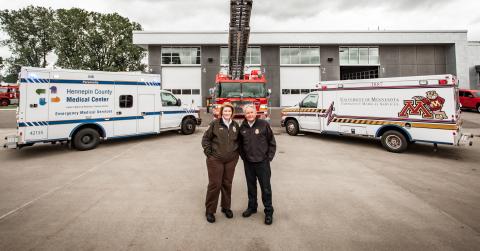
Saving Lives and Building Careers

In his more than 30 years with the Minneapolis Fire Department, Fire Chief John Fruetel has held many different positions, including firefighter. Through it all, he has always been proud to be a part of a department that strives to be as diverse as the community it serves.
That’s why, in 2016, he teamed up with Hennepin County Medical Center’s Emergency Medical Services Chief, Wendy Lynch, to launch the EMS Pathways Academy. The 12-week, paid-internship program serves Minneapolis residents, ages 18 to 30, who face barriers to employment or who may be unemployed or underemployed. Interns who go through the program receive training and certification that prepares them for careers, including emergency medical technician, firefighter, dispatcher with Hennepin Emergency Medical Services, paramedic and more.
The program is a partnership between the Minneapolis Fire Department, Hennepin County Medical Center, the Minneapolis Foundation, Project for Pride and Living and other healthcare organizations. The goal is to not only produce a steady stream of qualified candidates, but to also provide a group of often-underserved young people with a path to viable and rewarding careers. Career opportunities in the emergency medical field are growing fast, and with an aging population, demand will continue.
Training for the 2017 class, the second to graduate from the program, was held at the Robert J. Jones Urban Research and Outreach-Engagement Center (UROC) because of the center’s location and connection to the community. “We’ve focused a lot of our recruitment efforts on the Northside, so we’ve been at UROC and thought it would be an awesome place to have the EMS Pathways Academy,” Fruetel recalls. In addition to being a comfortable, familiar place, students say they appreciate UROC’s proximity to bus lines and free parking. The potential to partner with UROC and the Northside Jobs Creation Team was also a motivating factor.
Helping to ease at least some parts of the training process is important to Fruetel and Lynch, who understand the demands that the rigorous program places on participants, who are often single parents. With manageable class sizes in mind, just 27 out of more than 100 applicants were selected for the class of 2017 after passing background checks and meeting other criteria.
“It’s a challenging curriculum, especially for those who have been out of school for a while, so we try to prepare them for the experience,” Lynch says, explaining that in addition to working through a 1,500-page textbook, students also participate in hands-on activities, including a lot of heavy lifting. “The camaraderie and teamwork is great to see. They really get along and support each other.”
Six graduates from the 2016 class are already working as full-time firefighters for the City of Minneapolis, and several others are have jobs as emergency medical technicians or dispatchers in Hennepin County. Also, three graduates received additional scholarships from the Minneapolis Foundation to continue their education and are studying to be paramedics. “A lot of them have struggled with confidence in their lives, so it’s been amazing to see the changes they go through from the interview process to the first class and then graduation,” says Fruetel. “It’s not easy but they do it, and they’re very proud of their success and so are we.”